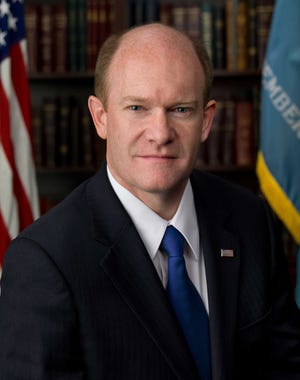Two weeks ago, I joined a bipartisan congressional delegation to the 2022 NATO Summit in Madrid. I returned home more optimistic about NATO’s unity and commitment to supporting Ukraine’s resistance to Russia’s brutal and unprovoked invasion — yet, I’m concerned about the commitment of the American people and its elected leaders to stay the course as the invasion grinds on. Our allies in Europe remain focused on Vladimir Putin’s daily aggression and future ambition. We must do the same.
Thanks to President JoeBiden’s leadership and our forceful reaction to Putin’s further invasion of Ukraine, NATO has never been more unified. You can see the proof of the alliance’s future strength in Finland and Sweden, where our delegation began its travels. These two Scandinavian countries are strong, innovative nations who have long maintained a cautious neutrality despite historic security threats from their Russian neighbors.
Our actions in the invasion’s aftermath helped convince our two Scandinavian partners that joining the alliance was their greatest defense from a similar attack. They saw a decisive NATO response that placed unprecedented sanctions on Putin’s regime and supplied the Ukrainian people with the weaponry they needed to beat back Russia’s initial assault on Kyiv. Popular support for joining NATO soared to strong majorities in both countries and their political leaders began to seek NATO membership.
Following our visit to Sweden and Finland, we arrived in Spain to encourage our allies to maintain their commitments and to advocate for the swift ratification of expansion. Finland and Sweden will greatly strengthen NATO’s northern flank, increasing American security by making Russia more likely to think twice before its next act of aggression.
As I thanked leaders in Madrid for their military and humanitarian support of the Ukrainian people, I felt as high a level of optimism from our partners and allies in NATO’s future as I can remember. The G7 is working together to put a cap on Russian oil prices, while European countries work to reduce dependence on Russian energy. Our partners and allies are committed to this for the long haul. As I return home, however, I need to ask: are we?
So far, the U.S. has shown bipartisan support for Ukraine. Congress quickly passed legislation to ensure Ukrainians had what they needed for their fight, while millions of ordinary Americans like you worked with religious institutions and civic organizations to send direct aid to Ukraine and the millions of refugees fleeing Putin’s brutal aggression. We should rightly be proud of the work we’ve done to date.
More perspectiveRussia is using rape as a weapon of war in Ukraine. Here’s what can be done about it.
Putin has seen this story play out before, however. When the Arab Spring broke out in 2011, we rallied behind Syrian revolutionaries and made Syrian despot Bashar al-Assad a pariah. As years passed, however, we lost focus. Russia and Iran came to his rescue and delivered the weapons and troops to sustain a brutal campaign against both resistance fighters and civilians, dropping barrel bombs on hospitals and schools in his successful campaign to crush the revolution.
Now, Putin is applying these lessons to Ukraine. Following his failed attempt to take Kyiv, he turned his attention to Eastern Ukraine, where he can more easily re-supply his troops. The invasion is poised to stretch on for months or even years to come, unless we sustain and strengthen our efforts.
Congress will face key votes in the coming months to support the efforts of NATO and prevent a grinding stalemate in Ukraine. We must quickly ratify the treaty formally admitting Finland and Sweden to NATO. We must push back aggressively on Russia’s use of food as a weapon — an issue that I brought up frequently in meetings last week with leaders from across Europe. Re-opening Ukraine’s ports will strengthen its economy, curtail the real risk of global starvation, and bring down the rampant increases in food prices. Last, we will need to pass another bill to provide economic, humanitarian, and military aid to Ukraine that helps shift the balance of power on the battlefield in Eastern Ukraine.
Unfortunately, focus in the United States on the invasion is beginning to fade, and with it, our support for the Ukrainian people. The invasion has drifted from the front pages and rarely leads the nightly news. In Congress, only three lawmakers voted against the first supplemental spending bill for Ukraine in March, but 57 opposed the second package in May. Without constant pressure from the American people, that number will keep rising.
We cannot allow the support of the last few months to flounder. Russian victory in Ukraine today, or two years from now, will still be disastrous. If Putin wins, he will simply continue to threaten and invade other countries to achieve his dark ambition of restoring imperial greatness. Russia under Putin invaded Georgia in 2008 and has never left the territories it has occupied since then, as the Prime Minister of Georgia vividly recounted when I spoke to him this week. The same fears of Russian aggression resonate in Moldova, the Baltic States, Poland and across Eastern Europe.
The recent NATO Summit underlined the critical test the West faces in the coming months. We can only continue to succeed by ratifying NATO’s expansion, acting with international partners to stop Putin from continuing to weaponize food, and funding more training and advanced weaponry for Ukraine’s defenders during new phases of the invasion. Americans must show Congress that there are consequences for failing to pass these bills. Ensuring that we succeed the next time we must take action to aid the Ukrainian people will take all of us — including you.

Sen. Chris Coons has represented Delaware in the U.S. Senate, where is a member of the foreign relations committee, since 2010.